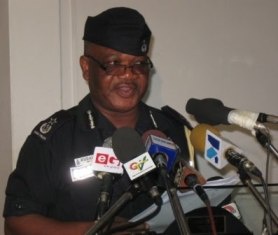Mr. John Kudalor, Inspector General of Police, has assured all political parties and democratic stakeholders that the Police Administration would collaborate with other state security agencies to create an enabling environment for the November 7 polls.
“The Police are neutral and apolitical and will ensure free and fair elections,” and would continue to provide for everybody in line with its mandate as a state institution.
He said some of the measures adopted to ensure free, fair and transparent elections include the formation of the Elections Taskforce, engagement with various political actors as well as other democratic players, provision of security personnel for presidential nominees and their nominated running mates.
Mr. Kudalor made this known during the launch of a four million pounds project: “Deepening Democratic Governance Programme,” by the United Kingdom, which aimed at supporting Ghana Government and non-state institutions to strengthen democratic governance and to promote free, fair, peaceful and credible general election in November.
The UK has contributed to five conservative free and fair elections in Ghana, investing more than six million pounds in 2012 to support the requirements of key electoral management bodies.
The current amount would be used for training and building the capacities of the Electoral Commission (EC), the Ghana Police Service, the Judiciary and civil society organisations led by the Star Ghana Project in the electoral process.
The British High Commissioner, Jon Benjamin, said the support was the UK’s small contribution towards ensuring a peaceful and credible democratic election in Ghana.
He commended the Ghana Police Service for arresting and extraditing some British murder suspects to face trial back in the UK.
Mr. Desmond Swayne, the UK Minister of State for International Development, announcing the package in Accra to stakeholders said lack of democratic governance undoubtedly, keeps people in pervasive poverty; which generates instability and conflicts.
He explained that this leads to the absence of livelihood, the absence of jobs and the absence of inclusive economic growth; which in the end, it boils down to jobs.
“The world needs 600 million new jobs over the next decade if we are going to avoid an increasing army of underemployed young people who are frustrated, bored and angry. And the only thing that I know that can create jobs is initiative, enterprise and investment,” he said.
“And the greatest enemy of enterprise, investment and initiative is poor governance. That is why we invest in democracy,” he added.
Mr. Swayne said poor governance leads to those administrations that are incapable of mastering their own revenues to be able to invest in the infrastructure that is required to make investment in jobs possible.
He said poor governance leads to pervasive corruption and cronyisms; which drives away investment and drives away the entrepreneurs.
“Democracy is the panacea, but undoubtedly strong democratic institutions holding government to account with strong civil societies and a free press are the best guarantee we have of governance. And that is why it is important to invest in it,” he stated.
He lauded Ghana for establishing a fierce reputation in Africa as a beacon of democracy; declaring that “whatever government Ghanaians choose for themselves in November, it is important in my view that you continue to be that beacon of democracy in the region that, other countries would seek to emulate.”
Mr. Swayne said because of the fact that Ghana had become a low middle-income country, this would be the last such investment that UK would be making on democratic structures.
“That is the measure of your success. We expect you as you go forward to be able to fund your democracy. We expect that the November elections will be free and fair,” he said.
Mrs. Charlotte Osei, the EC Chairman, expressed gratitude to the UK for the assistance towards strengthening Ghana’s democratic institutions.
General News of Friday, 8 April 2016
Source: GNA
Police officers are apolitical - IGP
 John Kudalor, Inspector General of Police
John Kudalor, Inspector General of Police
















